Targeted therapy makes waves as brightest hope for cancer treatment
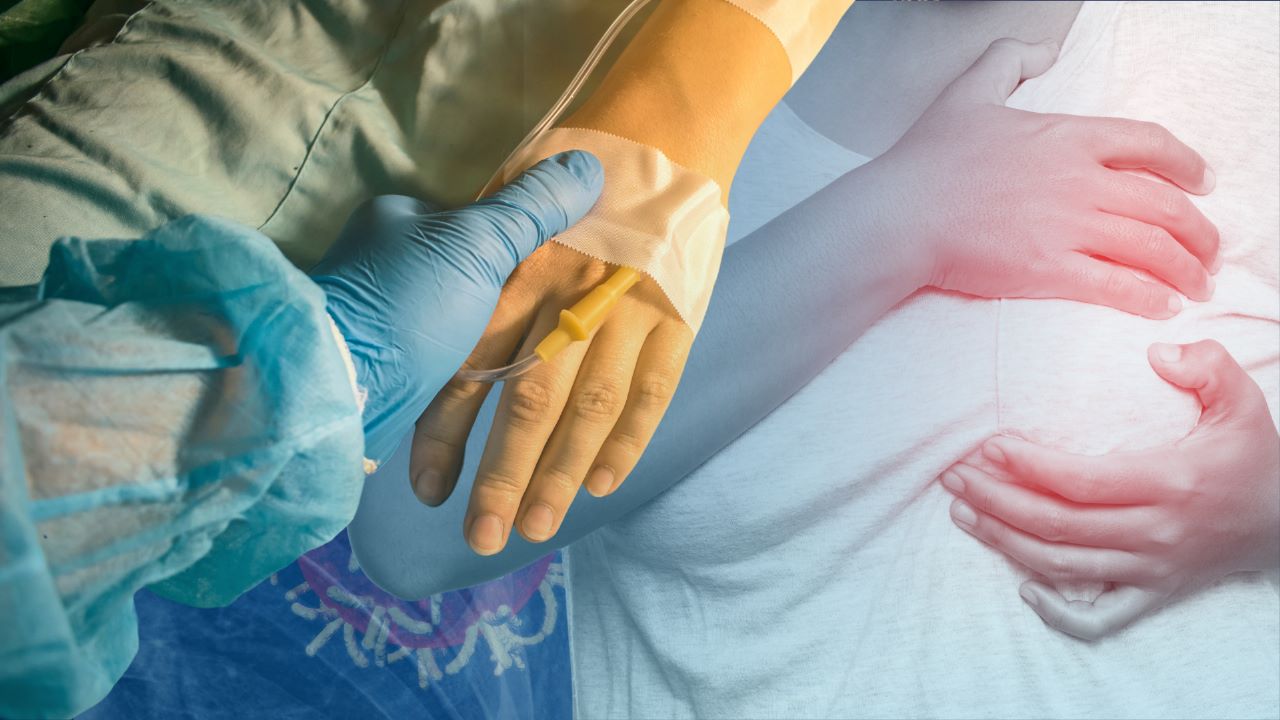
INQUIRER COMPOSITE IMAGE/DANIELLA MARIE AGACER
(First of two parts)
MANILA, Philippines—Targeted therapy is holding promise as a more effective way of treating cancer, leading some medical experts to conclude that a cure for the Big C is just around the corner.
As several treatments for cancer become more accessible to millions of patients worldwide and with advances and innovations in the medical field, hopes are rising that a cure for cancer has finally come.
According to Global Cancer Observatory (Globocan) registry, breast cancer ranked first in cancer incidence worldwide, with an incidence rate of 11.7 percent. It has surpassed lung cancer, with an incidence rate of 11.4 percent.
The latest Globocan data showed that there were 2,261,419 new cases of breast cancer recorded worldwide in 2020. A total of 684,996 deaths were also reported in the same year, pushing the disease to rank fifth in global mortality.
Article continues after this advertisementIn the Philippines, breast cancer is the leading type of cancer and is the most common cancer among women of all ages. There were 27,163 cases of breast cancer recorded in the country in 2020, while 9,926 Filipina women died of the disease.
Article continues after this advertisement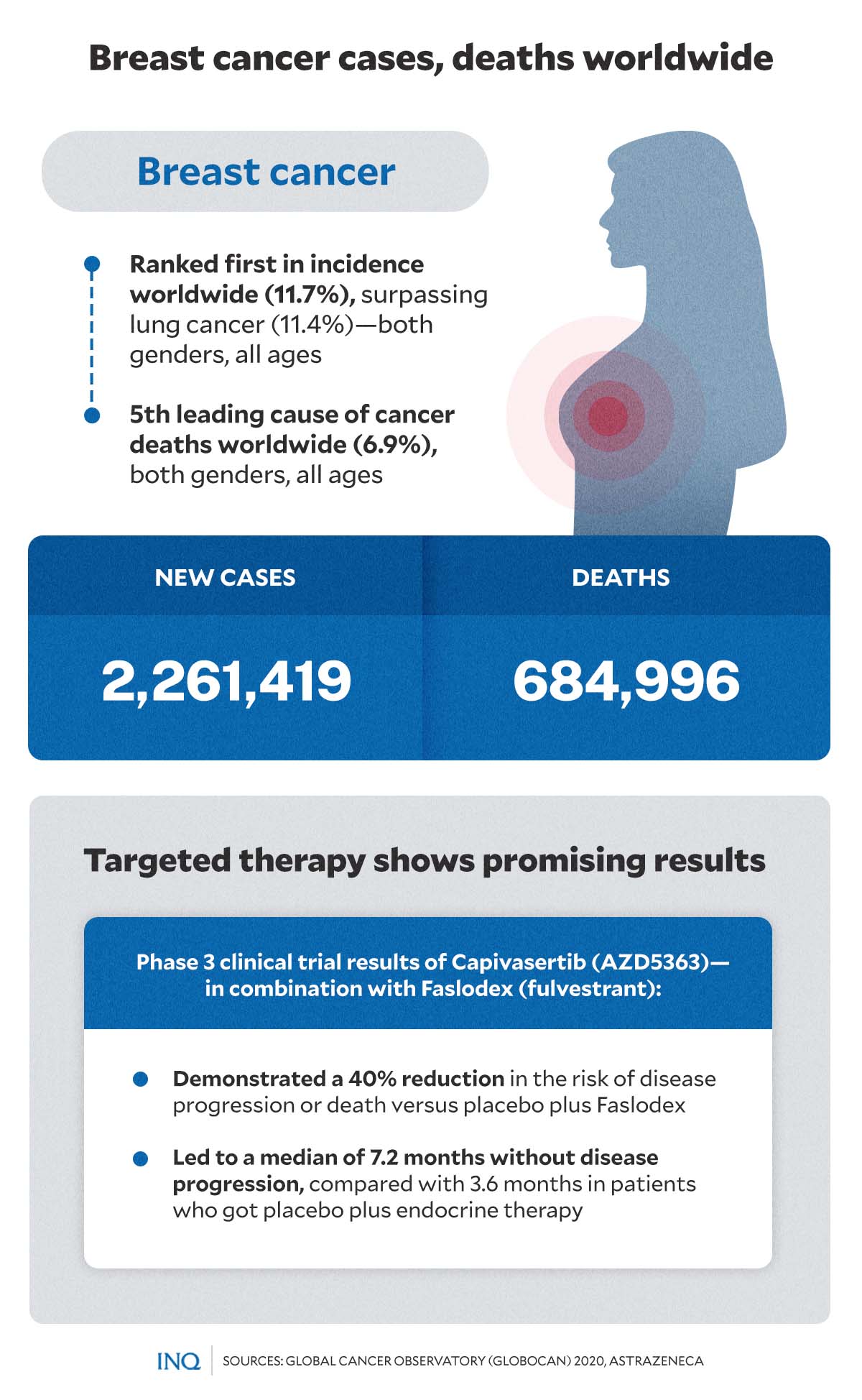
GRAPHIC Ed Lustan
Previous data by the Department of Health (DOH) showed that 3 in every 100 women in the country will be diagnosed with breast cancer in their lifetime. While women have a higher risk, the Philippine Cancer Society noted that for males the disease do not spare men—at least one in 1,000 men will have breast cancer in their lifetime.
According to the Philippine Cancer Society, as the precise stage of breast cancer progresses, the survival rate of those diagnosed with the disease decreases. Fortunately, there are various types of treatments available for breast cancer patients.
Among these are local treatments, which battle a tumor without affecting the rest of the patient’s body. This involves surgery and radiation therapy.
There is also systemic treatment, where specific medicines are injected into the bloodstream or given orally “to go throughout the body and reach cancer cells that may have spread beyond the breast.”
This type of treatment involves chemotherapy, hormone therapy, and immunotherapy.
Cancer ‘now treatable’
Another kind of treatment for breast cancer is targeted therapy, which uses targeted drugs or medicines that work differently than standard chemotherapy drugs. These targeted drugs, according to the Philippine Cancer Society, are currently most often used along with chemotherapy.
Various kinds of medicines for different kinds of cancer, including breast cancer, are already available in the country, according to Dr. Marvin Mendoza, head of oncology section at the National Kidney and Transplant Institute (NKTI).
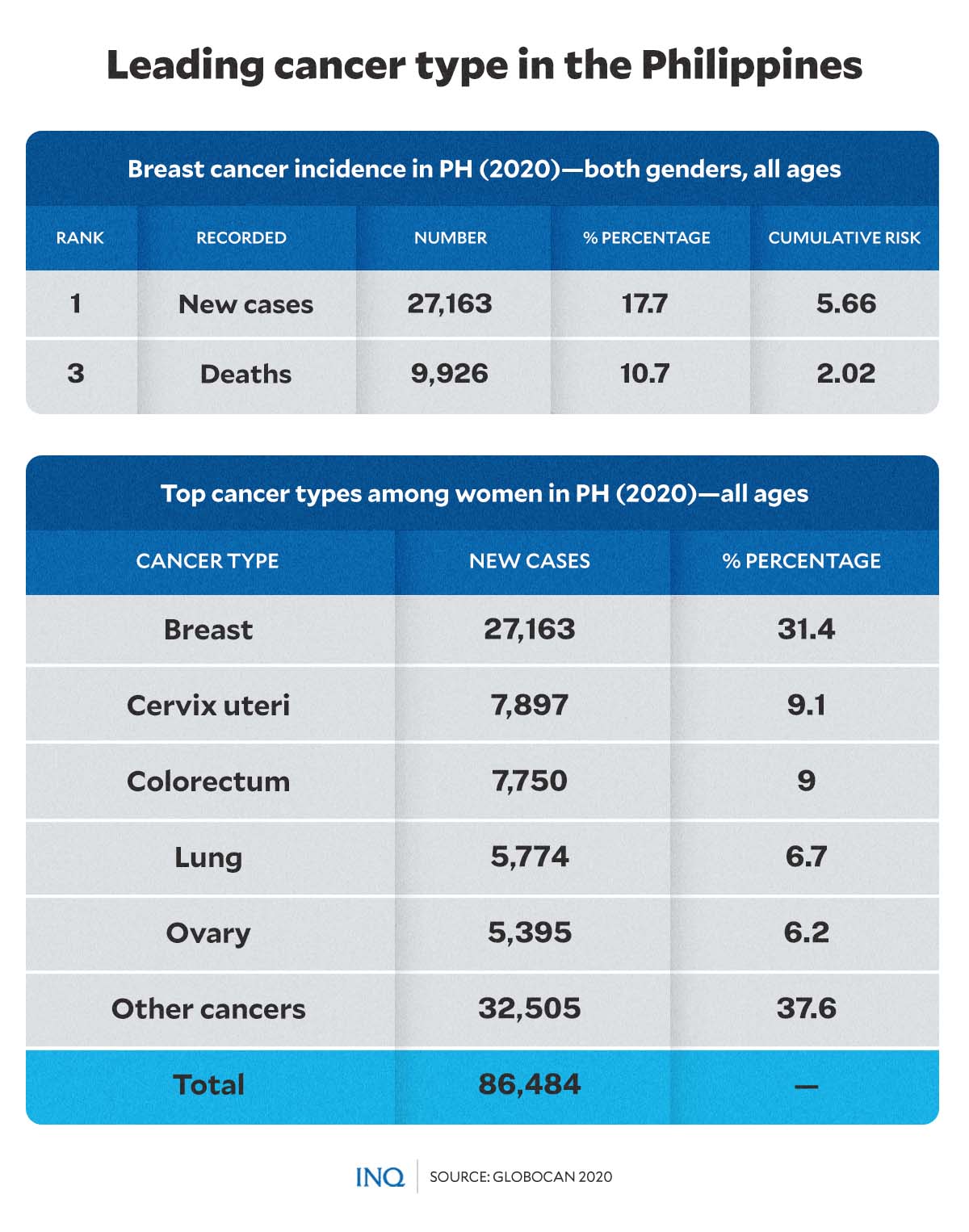
GRAPHIC Ed Lustan
Moreover, these medicines—which offer hope for treatment even in severe cases where cancer has already spread to other organs—were recently made more accessible.
In a statement last February 9, the NKTI announced that 23 public hospitals have started offering free targeted therapies for breast cancer patients who cannot afford the required 18 treatment cycles, which cost from ₱300,000 to ₱450,000.
“Options for treatment include a subcutaneous injection that takes about 5 minutes to administer or a three-hour intravenous administration that also requires an additional two hours or so for preparation,” said Dr. Mendoza.
But only 200 patients will be accommodated nationwide for the free cancer treatment due to the limited budget for the treatment program.
Last year, the DOH and the Department of Budget and Management (DBM) announced that P529.2 million worth of funds for cancer patients can be used until the end of 2023 through the Cancer Assistance Fund (CAF).
READ: Cancer assistance fund of P529.2M available until end of 2023 – DBM
“If we have to save more lives, we need more funds from the government not just for treatment but for testing because early diagnosis and treatment is far more effective than treating late-stage disease,” said Dr. Mendoza.
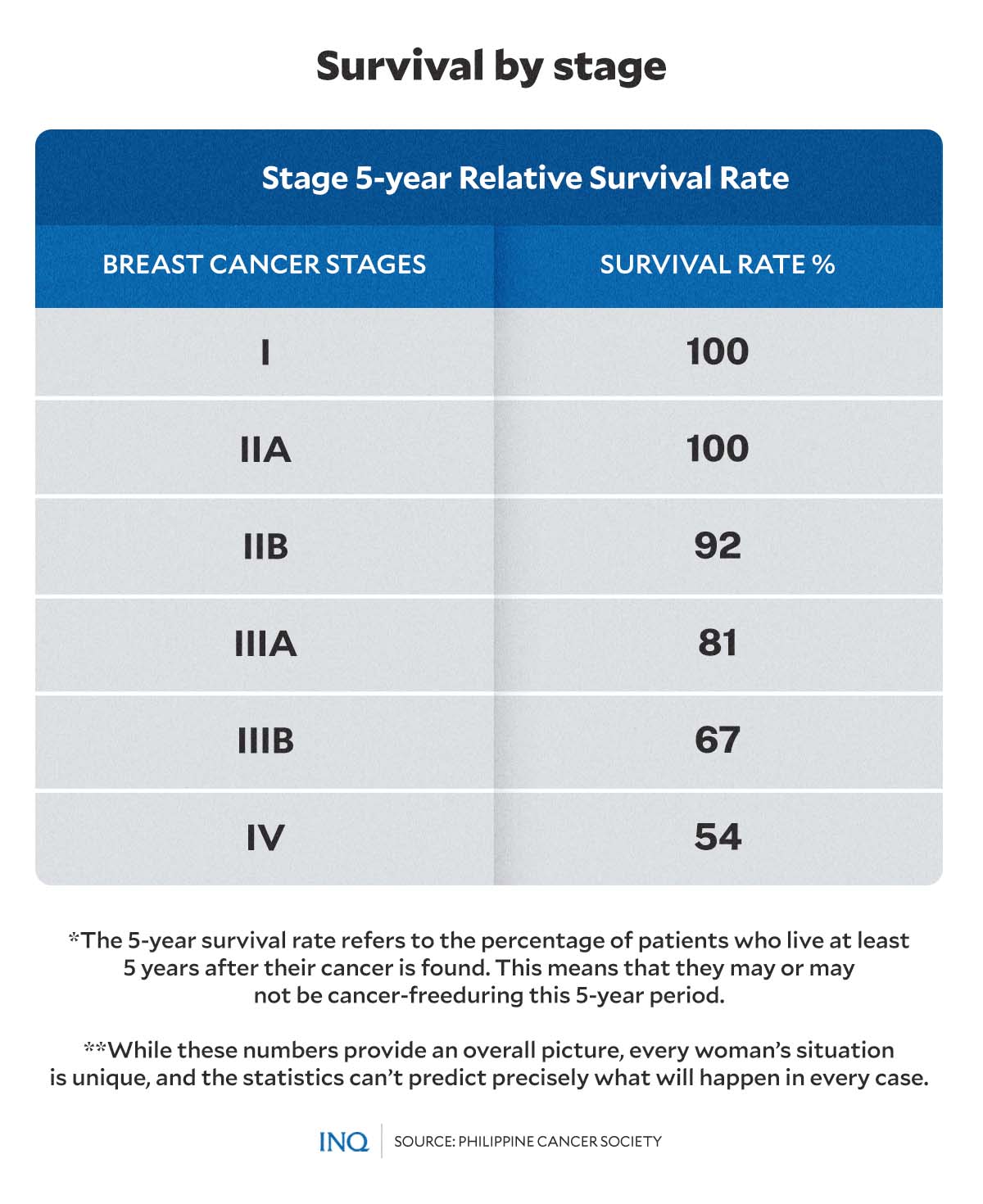
GRAPHICS Ed Lustan
Cancer is beatable
“We can beat cancer now. We can save lives. And we are trying our best to make treatment accessible nationwide, especially to those who cannot afford the treatment., In particular, we have medicines for breast cancer and lymphoma available in the DOH hospitals”, he added.
More targeted therapies give hope
Medical innovation, the NKTI said, has made significant progress throughout the years “to make treatment [for cancer] more effective and patient considerate, as well as easier for health care providers to administer, reaching more patients in a timely manner.”
In 2019, leading oncologists announced at a conference that an effective and affordable treatment for breast cancer, called biosimilars, was already available in the Philippines. Health experts said the introduction of biosimilars would help more breast cancer patients get treatment.
Before this, a biologic drug called Trastuzumab was the available option for targeted therapy used for the treatment of breast cancer patients with human epidermal growth factor receptor 2 (HER2).
However, only a small number of breast cancer patients in the Philippines are able to have access to biological drugs, like Trastuzumab, because of high costs, said Dr. Hope S. Rugo, professor and director of Breast Oncology and Clinical Trials Education at the University of California, who was present at the conference.
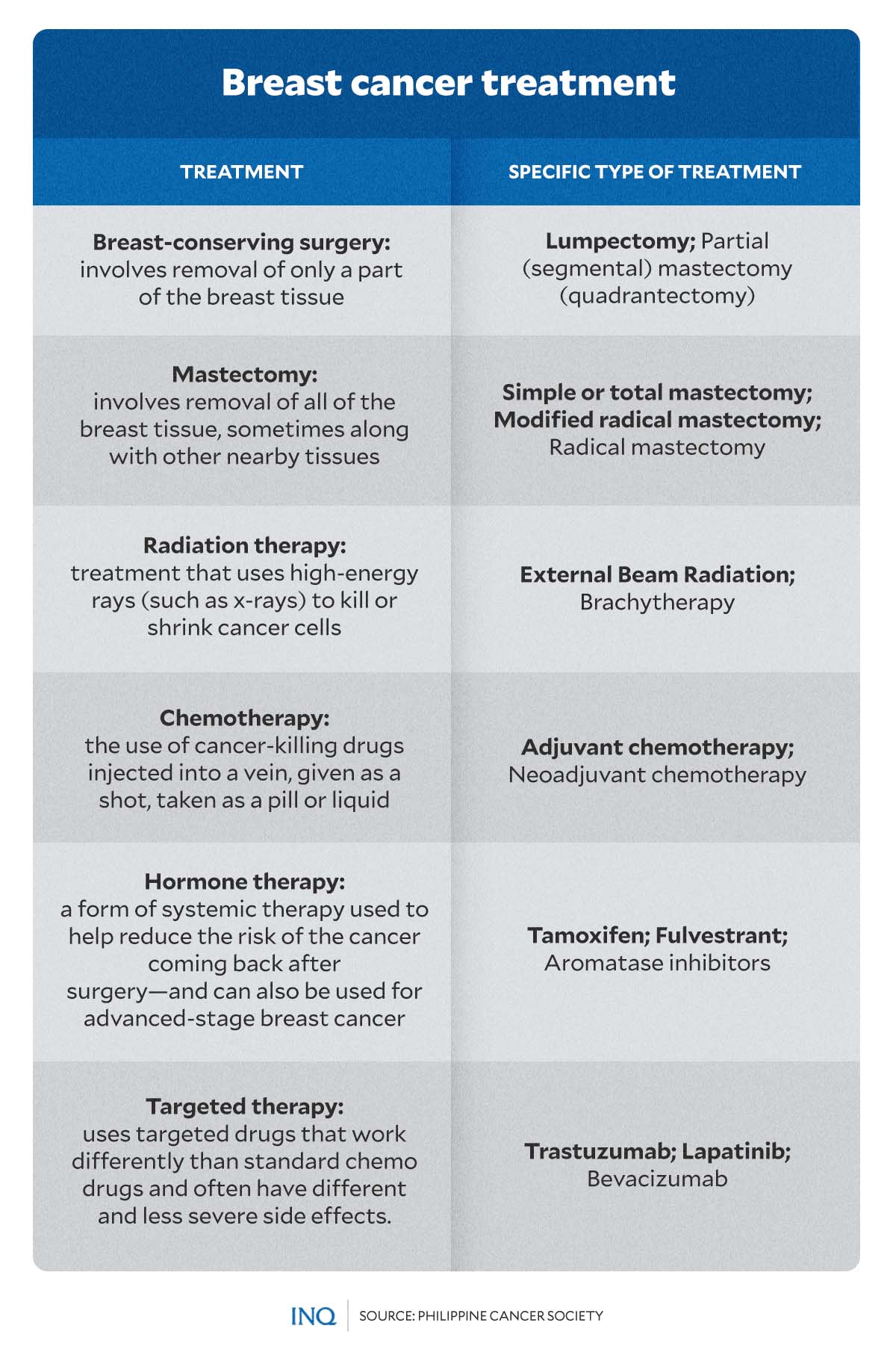
GRAPHIC Ed Lustan
Dr. Rugo explained that biosimilars offer a variety of benefits. Since it costs less than other targeted drugs in the market, health experts believe more women with breast cancer in the Philippines—including indigent patients—will finally have access to proper treatment.
“Now there’s a choice. There’s hope that we can deliver what is due for patients with HER2-positive breast cancer with this affordable treatment,” said Dr. Jorge Ignacio, oncologist and chair of the Cancer Institute of UP-Philippine General Hospital (UP-PGH).
“We will all do our part to bring cancer treatment to its ultimate level at the Cancer Center and have readied the requisition for this medicine,” Dr. Ignacio said.
Are we seeing a cure soon?
While advances and progress in medical research have offered promising results throughout the years, health experts believe that the cure for any type of cancer may still be beyond our grasp.
Treating cancer, after all, is different from curing cancer.
Johns Hopkins University defines treatment as “something that health care providers do for their patients to control a health problem, lessen its symptoms, or clear it up.” These include medicine, therapy, surgery, or other approaches.
On the other hand, a cure is when treatment makes the health problem go away for good. According to the American Cancer Society (ACS), curing cancer means that cancer has gone away through treatment, additional treatment is no longer required, and the cancer is not expected to come back.
“In most cases, it takes time to know if the cancer might come back,” said ACS.
“But, the longer a person is cancer free, the better the chance that the cancer will not come back. More often, when treatment appears to be successful, doctors will say the cancer is ‘in remission,’ rather than ‘cured’,” it said.
The American Association for Cancer Research also noted that there would possibly be no single cure for cancer since over 200 individual diseases fall under the “cancer” umbrella.
“Why haven’t we cured cancer? It’s not that we’re not smart enough,” said Dr. Jonathan Chernoff, chief scientific officer at Fox Chase Cancer Center in Philadelphia.
“It’s a very complex problem, more so than we thought 50 years ago. It turns out cancer is a general term,” said Dr. Chernoff.
“There are lots of different kinds of cancer in different tissues that act in different ways. They’re not all caused by the same mutations, and they’re not all going to respond to the same type of treatment,” he continued.